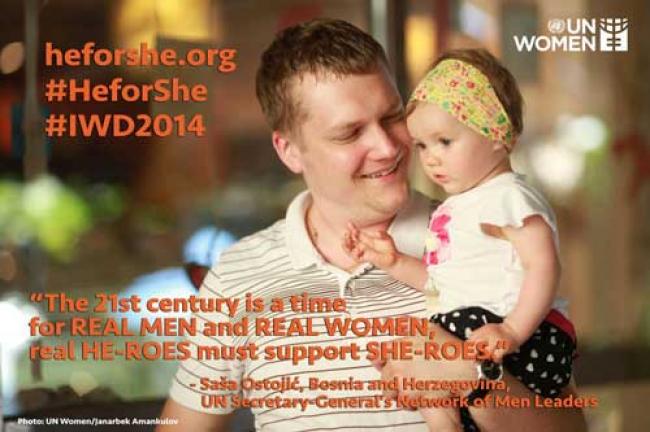“Gender equality isn’t just a women’s issue. It is an issue for all. It is a rights issue because women’s rights are human rights,” declared Phumzile Mlambo-Ngcuka, Executive Director of the UN Entity for Gender Equality and the Empowerment of Women (UN Women), as she kicked off an event on the margins of the annual session of the Commission on the Status of Women.
“Working with men and boys, transforming masculinity and traditional perceptions of manhood must be part of the gender equality agenda,” she added.
Mlambo-Ngcuka highlighted a new campaign launched by UN Women last week on the occasion of International Women’s Day called #HeforShe, in which men all over the world are being encouraged to speak out against the inequalities faced by women and girls.
Speaking directly to men and boys during the launch, she called on them to take a stand, to speak out and take action for their sisters, mothers, daughters and partners. “Because silence and inaction of good men conspire against women,” she stated.
Wednesday’s event, organized by Switzerland and Brazil, focused particularly on engaging men and boys to achieve theMillennium Development Goals (MDGs) – which call for the reduction of extreme poverty and other global ills by 2015 – for women and girls. MDG 3 is specifically targeted to gender equality and the empowerment of women.
“Persistent gender inequalities and discrimination of women and girls are a major obstacle to sustainable development, including poverty eradication and economic growth,” said Benno Bättig, Secretary-General of the Federal Department of Foreign Affairs of Switzerland and moderator of the discussion.
MDG 3 gave women’s issues some visibility, he noted, however it is silent on several key gender issues, such as violence against women and women’s unequal participation in decision-making. To address not only the symptoms but the very root causes of discrimination against women and girls, Switzerland supported a stand-alone goal on gender equality and women’s empowerment in the post-2015 development agenda.
“To overcome structural impediments to full gender equality, gender roles and relations must be transformed,” said Bättig. “And this transformation not only concerns women and girls, it requires the active involvement of men and boys.”
He added that while the engagement of men as allies has received little attention so far, it can have significant benefits for women and children, as well as for men themselves in contributing to the full achievement of all the MDGs.
The Swiss Government supports a project called “the part-time man” that promotes flexible working hours and conditions that allow men to spend more time with the family and giving women more time for their careers.
“Furthermore, our experience has shown that in societies where social norms and family honour are prevailing factors, a positive change in women’s social status is only possible when men’s attitudes change,” Bättig stated. “We thus have to work with men and boys as strategic allies and partners to achieve gender equality.”
Bafana Khumalo, of the South Africa-based gender equality organization Sonke Gender Justice, highlighted the engagement of men and boys as a means to try to limit the spread of HIV and promote women’s empowerment.
He highlighted Sonke’s flagship campaign, known as “One Man Can,” which has proven to be an effective way to change the HIV and gender-related behaviours and attitudes of men and women. It also contributes to the decrease in the use of violence by men against women, reduces the number of sexual partners, and increases their use of condoms, testing and services.
Sonke’s framework for engaging men and boys emphasizes three critical perspectives, he noted. These are involving men and boys as agents of change; engaging men and boys as equal partners; and treating men and boys as clients, so they can access and utilize services relating to their sexual and reproductive health rights.
Also highlighting the need to view men and boys as agents of change was Oswaldo Montoya from Nicaragua, the Global Coordinator for MenEngage, who also stressed the importance of offering men and boys opportunities to help them “step out of the masculinity box” and providing them with safe spaces to do so.
“I would like to propose to men and boys: forget about masculinity, embrace your humanity,” he stated.
Montoya also encouraged UN Women to appoint a focal point to advance the important work being done with men and boys and to engage more of them in the pursuit of gender equality.
Antonio de Aguiar Patriota, Brazil’s Ambassador to the UN, said that gender should be taken to refer to both women and girls, and men and boys. “When we discuss gender, we generally miss the reality of men and boys, their potential contribution to the empowerment of women and girls and their own gender-related specificities and vulnerabilities.
“Fully addressing all dimensions of gender inequality is a task that each and every one of us has to take very seriously – rich and poor, North and South, government and non-governmental organizations, government and private sector, men and women.”
A “sobering reminder” of the comparatively unfavourable situation of women in the world, he pointed out, is that out of the 193 Member States of the UN, only 8 have women serving as President and 13 as Head of Government.
“I am convinced that it is truly revolutionary to bring men and boys on board on the discussions on overcoming gender inequality,” Patriota said. “As we acknowledge that mainstream and rigid concepts of masculinity and femininity reinforce unequal and vertical power relations between men and women, we also help to accelerate progress on gender equality...
“It is time for men to join forces and enhance their role in helping to achieve a more egalitarian society. This is a win for women, a win for men and a win for our common humanity.”
Photo: UN Women/Janarbek Amankulov
